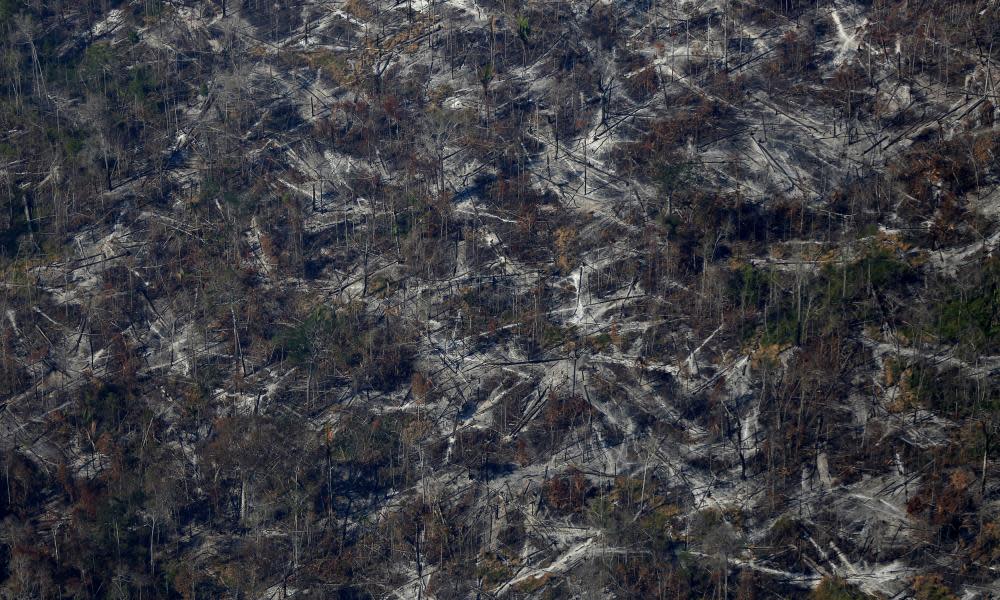EU states call for tough action on deforestation to meet 2020 UN goal

The UK, France and Germany have called on the European commission to launch tough new action to halt deforestation by the end of the year.
A long-delayed EU action plan should be brought forward “as soon as possible”, says a letter to the commission sent by the Amsterdam Declaration group of countries, which also includes Italy, the Netherlands and Norway.
To help meet a UN goal of halting deforestation by 2020, the EU should show “a leadership role, mobilising its political and market leverage, and promoting broader international dialogue and cooperation”, the letter says.
Actions should be taken to align “economic opportunities” with “responsible management of global supply chains”, says the letter signed by Denmark’s environment minister, Jakob Ellemann-Jensen.
Up to 80% of global forest loss is driven by agribusiness, even though research shows that better forest stewardship and natural climate solutions could provide more than a third of the climate mitigation needed by 2030.
The EU states moved on the issue as concerns continue to mount over Brazil’s recent election of a far-right supporter of Brazil’s former military dictatorship.
Jair Bolsonaro has pledged to designate land rights activists as “terrorists” and pave a highway through the Amazon, potentially spreading deforestation to an area of rainforest larger than Germany.
Biography
Born in Glicério in São Paulo in 1955 to parents of Italian descent, he served in the army from 1971 until 1988, when he was elected as a city councillor in Rio de Janeiro for the Christian Democratic party. In 1990, he became a federal congressman for the same party. He has since been affiliated with a number of political parties. On 22 July, he was officially nominated as the presidential candidate of the Social Liberal party.
Policies
Bolsonaro espouses populist and nationalist views that often stray into far-right territory. A vocal opponent of same-sex marriage, abortion, immigration and other progressive causes, he has defended the death penalty and the 1964-85 military dictatorship. On foreign policy, he has said he wants to improve relations with the US. Economically he says he is pro free market and privatisation.
Political style
Deliberately provocative and polarising. He has praised Gen Pinochet, expressed support for torturers and called for political opponents to be shot, earning him the label of "the most misogynistic, hateful elected official in the democratic world”. In his bid to capitalise on Latin America’s lurch to the right, he paints himself as a tropical Donald Trump: a pro-gun, anti-establishment crusader set on "draining the swamp" and cracking down on violent crime.
Controversies
On top of repeated calls for a return to dictatorship, he has made equally inflammatory attacks on women, black people, gay people, foreigners and indigenous communities. Earlier this year, he was charged by the attorney general with inciting hate speech.
Support and first round victory
Bolsonaro has a devout following among some conservative voters, who admire his promises to get tough on rampant violent crime, and won 46% of the vote in the election's first round.
His election campaign was backed by powerful agribusiness interests in Brazil but some industry leaders on Sunday called on him to show restraint.
Géraldine Kutas, the head of international affairs at the Brazilian Sugarcane Industry Association, said the Amazon’s importance to the world – and Brazil – had to be respected.
“We are perfectly fine with our current environmental regulations,” she said. “We are really committed to them and we will not support any change that would relax the rules.”
Strong EU laws could reduce the ecological footprint of commodities such as soy, palm oil and beef, which drive deforestation in the Amazon, according to Greenpeace.
Sébastien Risso, the group’s EU forestry director, said: “Ignoring the problem and delaying action will only move us deeper into catastrophic climate change and a major global species extinction.”
EU officials noted that Bolsonaro, who takes office in January, has backtracked on some campaign pledges and said it was too soon to consider tougher due diligence checks for deforestation, despite the president-elect’s statements and initiatives aimed at relaxing environmental regulation in the Amazon.
“We had them on our radar during the campaign speeches,” one EU source said. “We will assess whatever decisions are taken, once they’re taken.”

 Yahoo News
Yahoo News 
